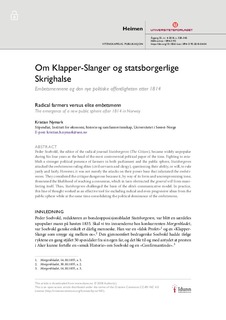Om Klapper-Slanger og statsborgerlige Skrighalse: Embetsmennene og den nye politiske offentligheten etter 1814
Journal article, Peer reviewed
Published version
Permanent lenke
http://hdl.handle.net/11250/2576532Utgivelsesdato
2018Metadata
Vis full innførselSamlinger
Originalversjon
Heimen - Lokal og regional historie. 2018, 55 (04), 328-342. 10.18261/issn.1894-3195Sammendrag
Peder Soelvold, the editor of the radical journal Statsborgeren (The Citizen), became widely unpopular during his four years as the head of the most controversial political paper of the time. Fighting to establish a stronger political presence of farmers in both parliament and the public sphere, Statsborgeren attacked the embetsmenn ruling elites (civil servants and clergy), questioning their ability, or will, to rule justly and fairly. However, it was not merely the attacks on their power base that infuriated the embetsmenn. They considered the critique dangerous because it, by way of its form and uncompromising tone, threatened the likelihood of reaching a consensus, which in turn obstructed the general will from manifesting itself. Thus, Statsborgeren challenged the basis of the elite’s communicative model. In practice, this line of thought worked as an effective tool for excluding radical and even progressive ideas from the public sphere while at the same time consolidating the political dominance of the embetsmenn. Om Klapper-Slanger og statsborgerlige Skrighalse: Embetsmennene og den nye politiske offentligheten etter 1814

